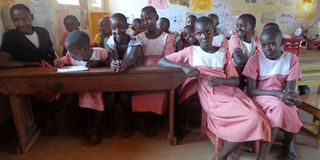Pupils in rural areas need more government help

Pupils of Bulyamusenyu Primary School in Nakaseke District during a lesson last month. Some of these pupils walk for about eight kilomrtres to get to school making them miss out on early lessons. Photo by Beatrice Nakibuuka
What you need to know:
Stories of walking several dusty and lonely roads for hours to school are thought to be tales by the old folk of our generation but sadly, these and more still happen in the lives of many rural school-going children in the present day.
Samuel Mayo, a Primary Six pupil at Kigumbya Primary School in Luwero District, walks about five miles (about 8km) every day to and from school. One day, as he strolled along the lonely, bushy and narrow path back home, he felt a sudden numbness in his leg and looked for a shade where he would rest because he was also tired.
“I am not sure how long I slept, but my parents came looking for me. At first when they found me lying in the bush, they thought I was dead but realised my leg had swollen. A snake had bitten me. I was immediately taken to hospital where I stayed for three days,” he recalls.
According to Boniface Otim, a teacher at the same school, many of the residents of this area are cattle keepers and even finding a small piece of land to build a school is not easy. Therefore the children have to utilise the very few schools that are found in the area.
Otim upholds that they usually end the lessons early for the safety of the children. “At about 4:30pm, we let the children go home so that they reach before it gets dark and thus help them escape being molested by wrong elements among other risks,” he says.
Mayo and many other children in districts of Luwero, Nakaseke and Nakasongola face similar challenges and more according to a survey by Action for Community Development (ACODEV), because of the scattered settlements and the fact that most residents concentrate on farming.
The rain
At Bulyamusenyi Chance School in Nakaseke, for instance, when it rains, most of the children do not go to school. Those who maneuver only risk their lives because there is a swamp near the school which floods whenever it rains. It, therefore, becomes very difficult for the young ones to cross.
Ezekiel Akamumpa, a pupil at the school, says, “At the swamp, we first remove the uniform and carry the books on our head because we do not want them to get wet then cross.”
Child marriages
Child neglect is very rampant in these three districts and some of the parents give in their children up for marriage to be able to get bride price. Enmmanuel Ssentongo, the Community Development Officer in Kamira Sub-county, acknowledges that despite their efforts to sensitise locals about the dangers of early marriage, it is hard to break the cultural norms and traditions that exist in this area.
Ssentongo says: “Many of the parents in the area are trading their children for cows and do not value education. Even when the child would wish to continue with school, the parents usually force them.”
Finding a solution
Given some of these hinderances, syllabus coverage is difficult in most schools yet these children sit for the same Primary Leaving Exams. According to Otim, the problem about distance was discussed in their school’s parents’ committee and some parents now give bicycles to children (those who can ride) so that they can be at school on time.
“Some parents also escort the children to school in the morning and also pick them up to reduce the risks of molestation while the children walk the lonely roads back home,” he says.
Similarly, John Chrysostom Muyingo, the state minister for higher education, says, “the government has tried to build a school in every sub-county to reduce the distance which children walk but in the places this has not happened, there is need for involvement of the parents. The problem with parents in the villages is that they first give the children chores in the morning so they reach late at school.”
According to Mary Betty Kabakurasi, the child rights governance officer at (ACODEV) in cattle-keeping areas of Uganda, sometimes learners are defiled by prisoners who are hired to work on farms making it difficult to trace the perpetrators.
“We work with police through the child and family protection unit and community development officers to get perpetrators of sexual violence against children but sometimes our efforts are futile like in cases where prisoners are involved because they keep being hired by different people in other areas.”
She adds that they, however, carry out community sensitisation to help curb the issue of child marriages and sexual violence against children and also try to teach learners the importance of moving in groups especially in risky places.
Lure of Odd jobs
At Tumba Chance School found in a fishing community near Lake Kyoga, many of the residents say education is a very long term and expensive investment yet one can earn quick money from fishing. They, therefore, do not value taking their children to school according to Simeon Buyinza, the community development officer in charge of Nakasongola District.
He cites culture beliefs and attitude held by parents as one of the biggest influences on the children’s school attendance because parents observe that engaging in petty businesses along the lake shores can help sustain their lives even without education.
“The parents, therefore, demotivate the school-going children by not providing the basic needs, school requirements and school fees so the only option a child is left with is to stay home and start selling fish along the shore,” says Buyinza.



